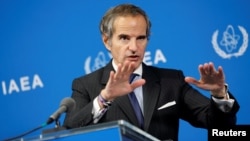Iran could resume producing enriched uranium within months despite significant damage inflicted on its nuclear facilities by recent US and Israeli air strikes, the head of the UN's nuclear watchdog said.
“The capacities they have are there. They can have, you know, in a matter of months, I would say, a few cascades of centrifuges spinning and producing enriched uranium, or less than that,” Rafael Grossi told CBS News in an interview broadcast June 29.
US and Israeli attacks on sites in Fordow, Natanz, and Isfahan had set back Iran’s capacity to convert and enrich uranium, said Grossi, who leads the Vienna-based International Atomic Energy Agency (IAEA).
However, he cautioned: “Frankly speaking, one cannot claim that everything has disappeared and there is nothing there.”
“Iran is a very sophisticated country in terms of nuclear technology,” Grossi said. “So you cannot disinvent this. You cannot undo the knowledge that you have or the capacities that you have.”
Israel launched a bombing campaign against Iranian nuclear and military sites on June 13, stating its aim was to prevent Tehran from developing nuclear weapons -- an objective Iran denies, insisting its program is solely for peaceful purposes.
The United States later joined the strikes, targeting three key facilities linked to Iran’s atomic program.
US President Donald Trump claimed on June 26 that Iran’s nuclear program had been set back “decades” and said he would consider further strikes if Iran resumed worrying levels of uranium enrichment.
On June 29, Trump told Fox News that Iran's nuclear capabilities were "obliterated like nobody's ever seen before. And that meant the end to their nuclear ambitions, at least for a period of time."
Iranian Foreign Minister Abbas Aragchi confirmed that the damage to nuclear sites was “serious,” though details remain unclear.
A major unresolved issue is the fate of Iran's stockpile of highly enriched uranium, enriched to 60 percent — above levels needed for civilian use but still below weapons grade. Iran is estimated to have had around 400 kilograms of this uranium.
“We don’t know where this material could be,” Grossi said. “So some could have been destroyed as part of the attack, but some could have been moved. So there has to be at some point a clarification.”
In his interview with Fox News, Trump indicated that he did not believe Iran had relocated its stockpile.
“It’s a very hard thing to do plus we didn’t give much notice. They didn’t move anything,” he said.
Meanwhile, Iranian lawmakers voted to suspend cooperation with the IAEA, and Tehran denied Grossi’s request to visit the damaged sites, including Fordow, Iran’s main uranium enrichment facility.
“We need to be in a position to ascertain, to confirm what is there, and where is it and what happened,” Grossi said.
Following calls in the hard-line Iranian Kayhan newspaper for the "arrest and execution" of the IAEA chief, US Secretary of State Marco Rubio said such statements were "unacceptable and should be condemned."
"We support the IAEA's critical verification and monitoring efforts in Iran and commend the Director General and the lAEA for their dedication and professionalism," he said. "We call on Iran to provide for the safety and security of IAEA personnel."
Iran's ambassador to the United Nations, however, assured Grossi needs not to worry. In an interview with US broadcaster CBS, Amir Saeid Iravani said "there is not any threat" against the inspectors or the director general. "Inspectors in Iran were "in safe conditions," he added.
Separately, French President Emmanuel Macron said he held a telephone conversation with Iranian President Masud Pezeshkian on June 29, telling him that Tehran’s best course of action was to return to the negotiating table and to allow resumption of the IAEA's work in the country.












